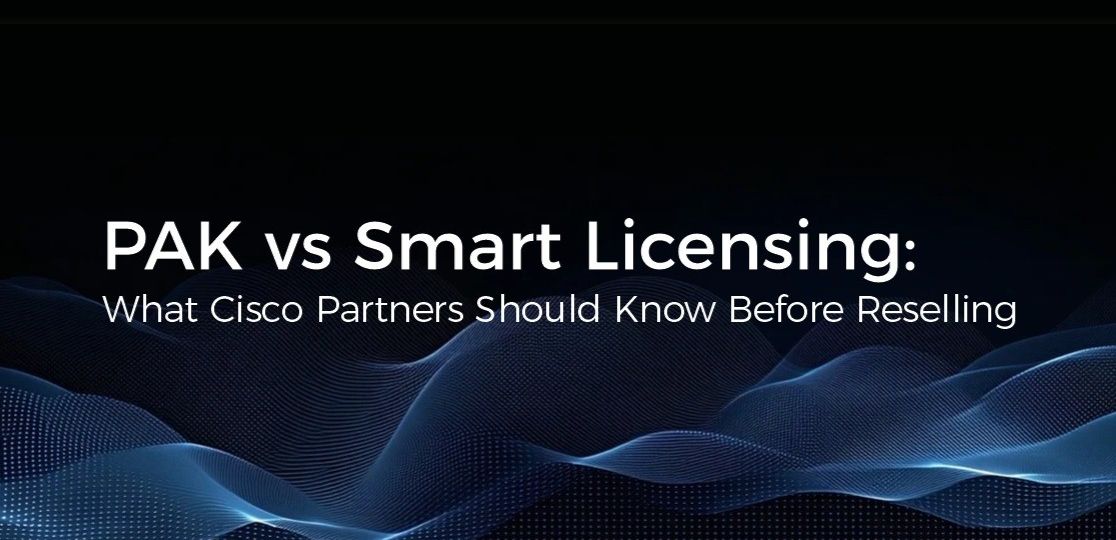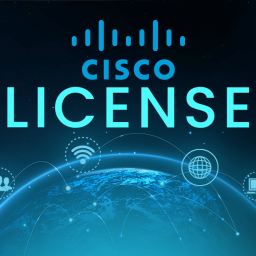
The landscape of Cisco software licensing has undergone a significant transformation, with Cisco Product Activation Keys, the networking vendor’s former software licensing process, being replaced by Cisco Smart Licensing. As a Cisco partner navigating this transition, understanding the implications of PAK versus Smart Licensing is crucial for making informed decisions that effectively serve your customers.
At TD Africa, we’ve been guiding partners through this licensing evolution across our offices in Lagos, Abuja, Port-Harcourt, and Ghana. Our comprehensive licensing support services help partners make strategic decisions about which licensing model best fits their customers’ needs while ensuring compliance and optimal cost management.
Recommended reading: How to Become a Cisco Partner Through TD Africa in 2025
Cisco PAK Licensing Overview
Product Activation Keys (PAKs) represent Cisco’s traditional licensing approach that has served the networking industry for years. Under this model, licenses are purchased as physical or digital keys that must be manually activated and installed on specific devices.
PAK licensing operates on a device-specific basis, where each license is tied to a particular piece of hardware. This creates a straightforward but rigid licensing structure that requires careful inventory management and planning. Partners working with PAK licenses must maintain detailed records of which licenses are installed on which devices, making license management a manual and time-intensive process.
The traditional PAK model also means that if a device fails or needs to be replaced, the license migration process can be complex and may require Cisco support intervention. This creates potential downtime and administrative overhead that can impact customer satisfaction and operational efficiency.
However, PAK-based license support is discontinued on ASR 903, ASR902, ASR907, and ASR914 routers, indicating Cisco’s clear direction toward Smart Licensing for newer products. This shift represents a fundamental change in how Cisco approaches software licensing across its portfolio.
Cisco Smart Licensing Overview
Smart Licensing represents Cisco’s modern approach to software license management, designed to address the limitations of traditional PAK licensing while providing greater flexibility and administrative efficiency. Smart licensing lets you say goodbye to product activation keys (PAKs), offering a more streamlined and user-friendly experience.
The Smart Licensing model operates through the Cisco Smart Software Manager (CSSM), which provides centralized license management across an organization’s entire Cisco infrastructure. This cloud-based approach allows partners and customers to manage licenses from a single dashboard, providing real-time visibility into license consumption and availability.
One of the key advantages of Smart Licensing is its flexibility in license allocation. Smart licensing offers a couple of key advantages for licensing Cisco software – you won’t ever lose a license again, and you can spread licenses across sites. This pooling capability means that licenses can be dynamically allocated where needed, reducing waste and improving cost efficiency.
With Cisco Smart licensing, the devices and systems contact Cisco to obtain an available license that authorizes usage and features. This automatic registration and validation process eliminates much of the manual work associated with traditional licensing while ensuring compliance and proper entitlement management.
At TD Africa, our licensing specialists help partners implement Smart Licensing solutions that optimize their customers’ infrastructure management while ensuring full compliance with Cisco’s licensing requirements.
Comparison Table
| Feature | PAK Licensing | Smart Licensing |
| License Portability | Device-specific, limited mobility | Flexible, can be moved between devices |
| Management Interface | Manual, device-by-device | Centralized through CSSM |
| Inventory Tracking | Manual record-keeping required | Automated real-time tracking |
| License Pooling | Fixed allocation per device | Dynamic allocation across the organization |
| Compliance Reporting | Manual compilation | Automated compliance dashboards |
| Future Support | Being phased out for newer products | Cisco’s strategic direction |
| Internet Connectivity | Not required for basic operation | Required for license validation |
| License Recovery | Complex process, potential license loss | Simplified recovery and reallocation |
Ideal Use Cases for Each
PAK Licensing remains suitable for specific scenarios, particularly in environments where internet connectivity is limited or where air-gapped security requirements exist. Organizations with stable, long-term deployments that rarely change their hardware configuration may find PAK licensing adequate for their needs.
Government agencies, military installations, and certain industrial environments where internet connectivity is restricted or prohibited may need to continue using PAK licensing or explore Smart License Reservation options for compliance with their security requirements.
Smart Licensing is ideal for most modern enterprise environments where flexibility, scalability, and administrative efficiency are priorities. Organizations with distributed deployments, frequent hardware changes, or complex multi-site operations benefit significantly from Smart Licensing’s centralized management capabilities.
Companies planning for growth or those with seasonal fluctuations in their networking requirements find Smart Licensing’s dynamic allocation particularly valuable. The ability to redistribute licenses based on changing needs without manual intervention or complex processes makes Smart Licensing the preferred choice for agile organizations.
At TD Africa, we work closely with partners in Lagos, Abuja, Port-Harcourt, and Ghana to assess their customers’ specific requirements and recommend the most appropriate licensing approach. Our consulting services help partners identify the optimal licensing strategy that balances cost, compliance, and operational efficiency.
FAQ
Can partners still use PAK in 2025?
Yes, partners can still use PAK licensing in 2025 for many Cisco products, though this is changing. You can migrate from Classic to Smart licenses via Cisco Smart Software Manager (CSSM) based upon your service contract status. However, PAK-based license support is discontinued on ASR 903, ASR902, ASR907, and ASR914 routers, and Cisco is clearly moving toward Smart Licensing as the standard. Partners should plan for this transition while they can still operate with existing PAK licenses.
What are the risks of PAK licenses?
The primary risks of PAK licenses include license loss during hardware failures, complex license recovery processes, and limited flexibility in license allocation. Additionally, as Cisco phases out PAK support for newer products, partners may face compatibility issues and reduced support options. The manual nature of PAK management also increases the risk of compliance issues and administrative errors.
Is Smart Licensing mandatory now?
Smart Licensing is not universally mandatory across all Cisco products as of 2025, but it is becoming the standard for new product releases. Cisco is now sending out most of its licensing as the “Smart” licensing, and certain newer product lines no longer support PAK licensing. Partners should prepare for eventual migration to Smart Licensing while planning their customers’ infrastructure investments.
Ready to navigate the complexities of Cisco licensing for your customers? TD Africa’s licensing specialists are here to help partners across Lagos, Abuja, Port-Harcourt, and Ghana make informed decisions about their Cisco software licensing strategy. Contact us today to discuss how we can support your licensing needs and ensure your customers get the most value from their Cisco investments.


